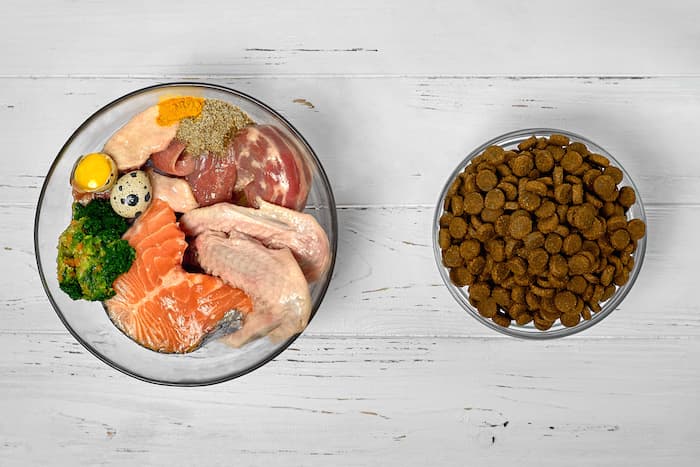When feeding your lovable four-legged friends, kibble is one of the most convenient and accessible options. However, it lacks variety in terms of taste and some nutritional aspects. Luckily, there are certain foods you can add to your dog’s kibble to enrich its meals. The following list highlights different foods high in enzymes, vitamins, and minerals that you can add to a dog’s meal that will benefit its health and add nutritional value to its meals.
- Protein
If you are curious about how and why to change your pet food, then consider the nutritional value that protein can add to your dog’s food. You can chop, grate and dice cooked meat to add to the kibble. The proteins you can add to the dog’s bowl include chicken pieces, turkey, beef, and venison. These products are packed with many nutrients that provide your dog with amino acids and extra protein. The protein also adds a burst of flavor to the food. Raw bones also provide your dog with calcium and can be a healthy chewing outlet.
- Fruits And Vegetables
Fruits and vegetables are full of nutrients and minerals essential for your dog’s overall health. These foods also provide extra fiber, which can help regulate your dog’s digestion. If you have a dog that weighs a little more on the heavier side, you can add diced or mashed raw vegetables to its meal. This will help your dog become full without overloading it with calories.
You can also add pumpkins, different squashes, and bananas, but be careful not to overfeed your dog grapes or raisins, as this can lead to kidney failure. Be careful and avoid any spicy or acidic foods like peppers and tomatoes. Prep the vegetables by chopping them into tiny pieces so that your dog does not choke when eating. You can also boil the vegetables in boiling water and immediately put them under cold water. This process is known as blanching your vegetables.
- Fats And Some Oils
If you’re a dog owner and your dog suffers from dry or itchy skin, and if its nails crack easily, then make sure to add some extra fat to the meals. Dogs cannot handle some dairy-based fats like butter, but fats like salmon oil, flaxseed oil, and coconut oil can supply your dog with vitamins and minerals that are good for the skin and will give your dog a softer coat.
You can also add fish oils that contain EPA and DHA and some omega-3 fatty acids that can help with arthritis. These types of fats can help give your dog healthier joints as well as more luscious skin. It can also combat any lousy breath that your dog may have. You can also use coconut oil if you are trying to help your dog lose weight or get more energy.
- Goat’s Milk
Goat’s milk has many naturally occurring probiotics that help your dog, especially if it suffers from digestive issues. This milk is known as ‘universal milk’ because it is easy to digest because of the small size of its molecules. The milk is also rich in essential fatty acids, a great energy source for your four-legged friend. These essential acids can prevent any inflammatory responses in your dog’s intestinal wall.
- Other Mix-Ins You Can Add
There are also other foods you can mix into your dog’s kibble like a cracked egg, meat broth, yogurt, as well as some cottage cheese. Lightly scrambled eggs are packed full of nutritional value and can help your dog’s overall health. Some food companies and veterinarians discourage feeding your dog leftovers, but you could if you stick to healthy foods and control the portion size.
Feed the dog leftover meat and vegetables, and avoid any fatty scraps that can lead to weight gain and have no nutritional value. This is also a great way to save cash on buying dog food. Extend your kibble’s use by supplementing it with healthy, clean leftovers. Be mindful of the portions when you mix table food into their kibble.
Conclusion
For your dog’s overall health and wellbeing, try mixing different foods into their kibble. This boosts their nutrition and stimulates their mind. Experiment with different fun shapes, textures, and aromas to create a more fun experience for your dog during meals. This can also save you more money in the long run. Feeding your dog healthy food may lessen their emergency trips to the vet. Keep these steps in mind and be the best owner for your beloved dog.



